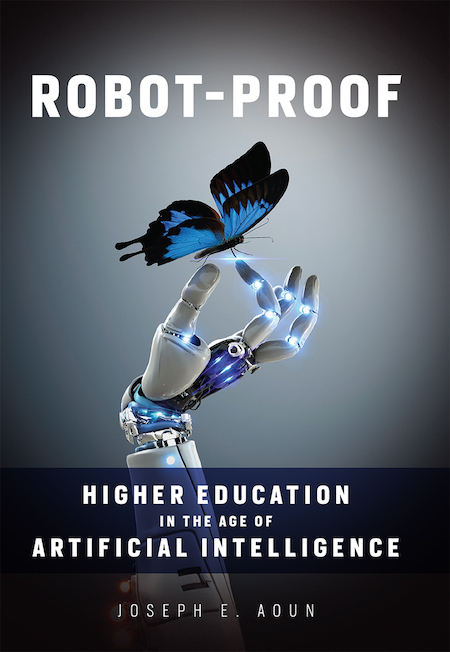The advancement of artificial intelligence means more high-skilled jobs are within the capability of smart machines. How should higher education adapt to prepare students to thrive in this new and fast-changing economy?
Northeastern University President Joseph E. Aoun explores this challenge in his new book, Robot-Proof: Higher Education in the Age of Artificial Intelligence. Below is an excerpt from the book that addresses the rise of A.I., higher education’s transformation, and the future of work.

Chapter 2
The difference between a person’s ability to obtain a middle-income job versus a lower-income one is largely a matter of his or her qualifications. This makes the middle class increasingly—perhaps inexorably—the province of the college educated, a trend that has been holding steady ever since the dawn of the global economy. Since 1980, the number of U.S. jobs that require more than a high school education has grown by 68 percent. This is more than double the rate of job growth in fields requiring less training or education. Simply put, to obtain and keep a foothold in the middle class—to say nothing of stepping up to the upper echelon of the economy—it seems that Americans will require more and more knowledge.
Yet even this time-tested premise may be coming into question, given the rise of robots and advanced machines. In the past, even as technology put some employees out of work, the economy generated new jobs. Displaced employees could fill these jobs by getting further education and training and acquiring greater amounts of knowledge than they needed for their obsolete positions. Today, however, as intelligent machines move into the workplace, the correlation between knowledge and value in the labor market is shifting. Knowledge economy sectors like finance and law are feeling the impact of machines that perform knowledge work. Some jobs that once offered salaried employment are moving into the gig economy. In the digital age, it seems that even high-paying, prestigious jobs are not safe.
In a world increasingly driven by computers, software, and algorithms, people who have knowledge in these domains remain in strong demand. For example, at a recent job recruitment event put on by Facebook, it was clear who was being sought. As the presenters spoke about optimization, petitioning algorithms, and data fetching, they handed out information cards stating, “Who are we looking for? Bachelors, Masters and PhD students who are studying Computer Science (or related subject).”
“Anyone with strength in data and analytics, you can apply,” explained one of the Facebook representatives. “But if you have coding experience, it’s a big plus.”
“When you join us,” added another presenter, “you get involved in every change in the world.”
Scenes like this augur well for college students studying high-tech subjects, as well as current employees skilled in such fields. But does it also mean that those of us who do not possess such skills are doomed to an economically inferior future? In a roboticized world, will we, unlike the students recruited at the session that day, be shut out from our chance to change the world?
As it turns out, not necessarily. According to a 2016 survey of employers, the skill cited as most desirable in recent college graduates is the very human quality of “leadership.” More than 80 percent of respondents said they looked for evidence of leadership on candidates’ résumés, followed by “ability to work in a team” at nearly 79 percent. These are both social skills that people develop through real-world interactions with others. They are also, until someone instills a computer with the commanding presence of Winston Churchill or the coalition-building skills of James Madison, not vulnerable to automation. Written communication and problem solving—skills more commonly attributed to a liberal arts education than a purely technical one—clocked in next at 70 percent. Curiously, technical skills ranked in the middle of the survey, below strong work ethic or initiative.
At the same time, many employer surveys skew to pessimism about today’s employees. It is common, for example, to hear companies cite the “skills gap,” in which new hires lack the training to cope with the demands of a fast-paced modern work environment. Some economists dismiss this perspective as groundless, citing the stagnant median wage as evidence that the job market is a buyer’s one and that employers feel no compulsion to raise wages to attract talent. But that only proves that there is stagnant demand for the commonplace skills of median employees. Premium employees possess skills that command premium wages. As a matter of fact, since the 1980s, the compensation for the top-paid 10 percent of people in the workforce has risen sharply in comparison to those at the median. Regardless of compensation, premium jobs—meaning the most fulfilling, creative work in either the private or public sectors—are plums for the most qualified.